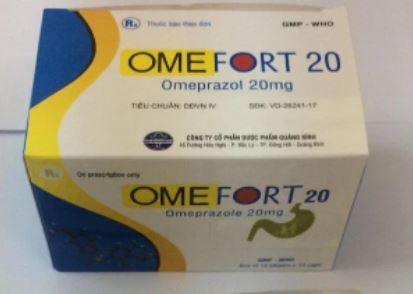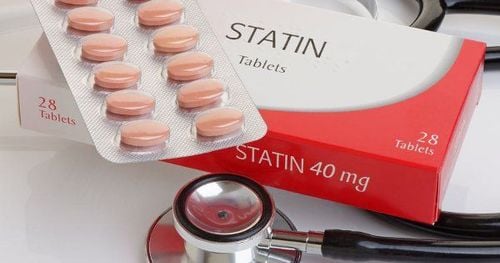This is an automatically translated article.
Bilgrel 75 is a cardiovascular drug with antiplatelet, antithrombotic, and anti-atherosclerotic effects. The drug contains the active ingredient Clopidogrel 75mg. Bilgrel 75 is researched and manufactured at Bilim Ilac Sanayi Ve Ticaret AS - TURKEY and formulated in capsule form. Let's find out more details about the use and use of Bilgrel 75.
1. Indications to use Bilgrel 75mg?
Clopidogrel is a selective inhibitor of the binding of Adenosine diphosphate (ADP) to the platelet receptor, followed by activation of the Glycoprotein Ilb/IIIa complex. With the effect of helping to prevent platelet aggregation and prevent the formation of blood clots.Bilgrel 75mg drug is used in the following cases:
Primary prevention of thromboembolic disorders including: stroke, myocardial infarction, peripheral artery disease. Control and secondary prevention in atherosclerotic patients with recent stroke, myocardial infarction, or ischemic heart disease with established peripheral artery disease.
2. How to take Bilgrel 75mg
Bilgrel 75 is in the form of capsules and is taken orally. Patients can take Bilgrel with or without food.
Dosage is listed on the product packaging or you can refer to the dosage below.
Patients with a history of atherosclerosis: The usual dose is 1 tablet of Clopidogrel (75mg) per day. The prophylactic dose to prevent thromboembolic disorders such as myocardial infarction, peripheral artery disease and stroke is: 1 tablet of Clopidogrel (75 mg)/day. Treatment of unstable angina or myocardial infarction: The initial dose is 300 mg Clopidogrel, administered as a single time, and the maintenance dose is 75 mg Clopidogrel / day. No dose adjustment of Clopidogrel is required in the elderly or in patients with renal impairment. Adults should take a single dose of 75mg once daily. No dose adjustment is required for elderly patients and patients with renal disease. The safety and efficacy of clopidogrel therapy have not been established in patients < 18 years of age. Note: The dosage above is only given for reference purposes, not a substitute for a drug instruction sheet or a prescription from a doctor or pharmacist. The specific dose will depend on the condition and the progression of the disease. To get the right dose, patients need to consult with qualified medical professionals.
3. What to do when overdose, forget dose of Bilgrel 75mg?
Overdosage of Bilgrel 75mg leads to prolongation of bleeding time and complications of bleeding. Symptoms of overdose may include fatigue, dyspnea, vomiting and gastrointestinal bleeding. In this case, the drug should be discontinued and then gastric lavage within 4 hours of administration. Overdose of Bilgrel can only treat symptoms, stop bleeding in the gastrointestinal tract and clear the airways for patients.
If the patient forgets a dose, take Bilgrel as soon as possible. However, if it is almost time for the next dose, skip the make up dose and take the next dose at the scheduled time. Never double the prescribed dose of Bilgrel.
4. Contraindications to use Bilgrel 75mg
Bilgrel 75 should not be used in the following cases:
Patients with hypersensitivity to Clopidogrel or to any of its ingredients. Patients with bleeding or ulceration of the gastrointestinal tract or intracranial hemorrhage. People with severe liver failure.
5. Bilgrel 75mg . drug interactions
When combining the use of Bilgrel 75mg with the following drugs, drug interactions may occur.
The combination of Clopidogrel and Aspirin may increase the risk of bleeding, caution should be exercised when combining these two drugs. However, Clopidogrel and Aspirin can be taken together for about 1 year. Clopidogrel in combination with Heparin may lead to an increased risk of bleeding. When Warfarin is combined with Warfarin, caution should be exercised, as it may increase the risk of bleeding. There have been reports of concomitant use of naproxen and clopidogrel increasing the potential for gastrointestinal bleeding. Therefore, caution should be exercised when clopidogrel is used together with non-steroidal anti-inflammatory drugs. In clinical trials, Clopidogrel inhibits Cytochrome P450 (2C9) which may affect the metabolism of Phenytoin, Fluvastatin, Tamoxifen, Warfarin, Tolbutamide, Torsemid,....but there are no data on the severity of interactions above. Care should be taken when combining Clopidogrel with the above drugs. CYP2C19 inhibitors (Omeprazole, Chloramphenicol., Esomeprazole, Fluvoxamine, Moclobemide, Fluoxetine, Voriconazole, Fluconazole, Ticlopidine, Cimetidine, Carbamazepine, Oxcarbazepine, Ciprofloxacin) when combined with Clopidogrel may decrease concentrations of the active metabolite Clopidogrel . To make sure it is safe to take Bilgrel 75mg, patients should list all the medications they are taking and other medical conditions they are having to their doctor. Let your doctor prescribe the most appropriate medication.
6. Side effects when taking Bilgrel 75mg
During the use of Bilgrel 75mg medicine, patients may experience some unwanted side effects, including:
Gastrointestinal disorders such as: diarrhea, nausea, abdominal pain, indigestion . Skin allergy, erythema and pruritus, erythema maculopapular, skin ulceration, urticaria, blistering of the skin, eczema. Chest tightness Nosebleeds, bleeding in joints, endoscopic bleeding. Gastrointestinal bleeding, gastric ulcer. Neutropenia, severe agranulocytosis, thrombocytopenia, purpura, aplastic anemia, hematoma. Kidney disease. Loss of taste. Acute arthritis, arthralgia, back pain, chest pain, hernia. Coughing up blood, hematuria, retroperitoneal hemorrhage, eye or hemothorax. Whole body edema. Heart failure, high blood pressure. Hypercholesterolemia, uremia, uremia, gout. Upper respiratory tract infection, cough, rhinitis, pneumonia, sinusitis, shortness of breath, bronchitis. Depression, insomnia, anxiety. Cataracts. Conjunctivitis. Urinary tract infection. Cystitis. Increased liver enzymes, viral hepatitis, increased bilirubin in the blood, fatty liver. Attenuate. Flu-like symptoms. If the patient develops any side effects, immediately notify a qualified doctor or pharmacist for timely treatment.
7. Precautions when using Bilgrel 75mg for treatment
Before using the drug, the patient should carefully read the drug instruction leaflet or can refer to some of the following notes:
Caution when using Clopidogrel in patients with bleeding due to trauma (such as ulcers), surgery or other medical conditions. Clopidogrel prolongs blood clotting time, which may affect patients undergoing medical or dental surgery. In case the patient is about to have surgery, clopidogrel should be discontinued 5 days before surgery. Clopidogrel should be used with caution in patients with hepatic impairment, those with altered metabolism (poor metabolisers due to CYP2C19). There are no adequate studies on the use of Clopidogrel in pregnant women. in case of necessity. The use of drugs should be carefully considered when the benefits outweigh the risks. There are no studies on the excretion of Clopidogrel in breast milk. Therefore, caution should be exercised when using Bilgrel 75mg in nursing women. If it is necessary to use it, a decision should be made between discontinuing the drug or stopping breastfeeding. Clopidogrel does not affect the ability to drive and use machines. However, patients should still be cautious when using the drug. Bilgrel 75 is a cardiovascular drug with antiplatelet, antithrombotic, anti-atherosclerotic effects. The drug contains the active ingredient Clopidogrel 75mg. To ensure the effectiveness of treatment and avoid unwanted side effects, patients need to strictly follow the instructions of the doctor, professional pharmacist.
Follow Vinmec International General Hospital website to get more health, nutrition and beauty information to protect the health of yourself and your loved ones in your family.
Please dial HOTLINE for more information or register for an appointment HERE. Download MyVinmec app to make appointments faster and to manage your bookings easily.













